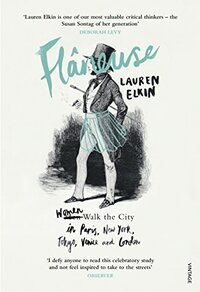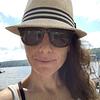You need to sign in or sign up before continuing.
Take a photo of a barcode or cover
231 reviews for:
Flâneuse: Women Walk the City in Paris, New York, Tokyo, Venice and London
Lauren Elkin
231 reviews for:
Flâneuse: Women Walk the City in Paris, New York, Tokyo, Venice and London
Lauren Elkin
I was excited for this one. It started off strong and I eagerly devoured the first chapters. However, it started lagging and lost me somewhere in the middle.
A more personal, less theoretical approach to the concept than I thought, but I still enjoyed it. Because Elkin primarily writes about her own experiences walking the cities she's lived in, the books feminism is mostly white feminism. Which is fine, except I would have wished for more acknowledgements that the practise of walking differs very much according to where you are and what you look like and that it might be easier for a white, heterosexual, middle-class woman to walk in Paris and New York than it is for others somewhere else. That being said, the book does make you want to take off and wander aimlessly. I could imagine everyone who likes Rebecca Solnit's A Field Guide to Getting Lost will enjoy this as well.
I think when I started this book it was absolutely amazing, it was speaking to me so much, it was really exactly how I was feeling. But then after the beginning, that feeling kind of left me? I realized this was more of a sort of exploration of different women artists, writers, etc. It was interesting and not something I have a lot of experience with or knowledge about, but it wasn't exactly what I was expecting from the book either. It felt less about the cities and more about these different artists and a sort of tenuous connection of their experiences to the cities. But then there were parts that just spoke so clearly and vibrantly to me. I sort of wish I had taken notes while reading, because there were some parts that I really wanted to think about more. I might do that from now on when I read. But I think it's ok for a book to have some parts that really click with you and others that just don't. It doesn't mean it's good or bad, this is just how I felt reading it! I appreciate some of the ways this book made me feel and how it shifted my way of existing in the world a bit, even if other parts were completely not what I was into.
This book is an extra special find for ladies who wander in cities. From the title to the photographs to the writing that generates lots of margin notes, it’s a gem to find a book that speaks directly to the sisterhood of women who defy the conventional rules of where to walk and how hard it is to be invisible on the streets alone, especially in a skirt.
Reading it over the course of several weeks—generally one complete chapter at a time, often while sitting outdoors on a park bench in the sun—this book has prompted many more conversations with friends than much of what I have read recently.
Yet for all the reasons to love this book, the urban planner in me struggled against everything this book was not. Part memoir, part literary analysis, part biography of female authors and artists, part travel writing, lots of things that I look for in cities is totally lost or obscured. And I was confused for awhile by what was going on in general until I realized that each chapter was about place that fit chronologically into the sequence of the author’s life flushed out by her experience over time with one particular writer or filmmaker or artist.
The chapter “Paris: Children of the Revolution” is particularly wonderful. Spend 40 minutes in some library or bookstore or on a friend’s couch just enjoying it.
This is a book that I will share eagerly with a cluster of women in my life who read extensively and think deeply about cities and their streets and how women fit there. I’d struggle to suggest it to a wider audience.
Reading it over the course of several weeks—generally one complete chapter at a time, often while sitting outdoors on a park bench in the sun—this book has prompted many more conversations with friends than much of what I have read recently.
Yet for all the reasons to love this book, the urban planner in me struggled against everything this book was not. Part memoir, part literary analysis, part biography of female authors and artists, part travel writing, lots of things that I look for in cities is totally lost or obscured. And I was confused for awhile by what was going on in general until I realized that each chapter was about place that fit chronologically into the sequence of the author’s life flushed out by her experience over time with one particular writer or filmmaker or artist.
The chapter “Paris: Children of the Revolution” is particularly wonderful. Spend 40 minutes in some library or bookstore or on a friend’s couch just enjoying it.
This is a book that I will share eagerly with a cluster of women in my life who read extensively and think deeply about cities and their streets and how women fit there. I’d struggle to suggest it to a wider audience.
I was delighted by how well-written and entertaining this book was. Part memoir, part feminist literary history of women's experience of cities.
This book made me want to be friends with Lauren Elkin SO MUCH. She comes across as someone who is very clever and wise, but also human. This is hard to do, as a woman even more so I think; to come across as knowing and intelligent but also warm and loveable. I've added many writers and artists to my To-Read list because of this book, and it's made me so much more aware of my own existence as a Flaneuse! I too love to travel alone, love to wander cities for whole afternoons, people watching and writing. I love that I've found a kindred spirit through this book!
3.5? I really enjoyed this book, I just wanted more nonfiction and less memoir.
I had to force myself through this book, a disappointing read.
Far from the analysis of women in cities and the act of flânerie au féminin I was hoping for, this book reads more as a collection of literary biographies with autobiographical elements from Elkin’s own experience. The author is insufferable, and her commentary on living in Japan is grating and verges on disrespectful. She claims she’s not a spoilt American but it certainly comes off that way; this text reeks of privilege.
This book was only saved from a one star review by the chapters on protest and Agnès Varda, which provide refreshing analytical insight.
Nonetheless, anyone interested in feminism and the act of walking should look elsewhere...
Far from the analysis of women in cities and the act of flânerie au féminin I was hoping for, this book reads more as a collection of literary biographies with autobiographical elements from Elkin’s own experience. The author is insufferable, and her commentary on living in Japan is grating and verges on disrespectful. She claims she’s not a spoilt American but it certainly comes off that way; this text reeks of privilege.
This book was only saved from a one star review by the chapters on protest and Agnès Varda, which provide refreshing analytical insight.
Nonetheless, anyone interested in feminism and the act of walking should look elsewhere...
3.5 stars. Parts of this book were profoundly mediocre; others were profoundly beautiful and wise. Unfortunately, I found that the mediocre heavily outweighed the brilliant. I am generally not a fan of memoir, and most of the memoir in this book did not work for me, as I expected, but I also didn't like many of the short biographies that were a large part of the book. I thought this book was at its best when the author was considering general actions and attitudes instead of particular people or events, but those parts did not save the book.






